Looking for the best SysAid alternatives? You’re not alone. While SysAid is a popular service management tool, many businesses find themselves needing a more tailored solution that fits their unique needs, whether it’s enhancing incident management, managing asset management processes, or offering a more user-friendly interface.
This guide dives into 12 top alternatives to SysAid. Whether you’re a small business managing routine tasks or a large enterprise optimizing your IT infrastructure, we’ll break down the key features, pricing, and automation capabilities of each platform. Plus, we’ll explore how they handle everything from service requests to problem management and beyond.
Stick around to find the right ITSM solution that matches your organization’s requirements.
Criteria for Selecting an ITSM/Help Desk Solution
Choosing the right ITSM or service desk solution can transform your business operations. To ensure you pick the best platform, here are the key factors to consider:
1. Key Features and Functionality
Look for platforms that offer robust tools like automation capabilities, a self-service portal, configuration management database (CMDB), and a reliable ticketing system. Features like remote control, remote monitoring, and knowledge management also help enhance operational efficiency.
2. User Interface and Experience
A user-friendly interface is essential to reduce the learning curve for your team. Seamless navigation and easy onboarding ensure your IT and support teams can focus on solving issues rather than struggling with the platform itself.
3. Integration Capabilities
Opt for solutions that offer smooth integration with tools like Microsoft Teams, email systems, or other business-critical software. A flexible platform ensures compatibility with existing workflows and processes.
4. Scalability
Your ITSM software should grow with your business. From supporting small teams handling routine tasks to large enterprises managing complex business processes, scalability is a must.
5. Cost and Value
Balancing features and pricing is key. Look for platforms that provide cost-effectiveness without compromising on tools like change management, release management, or patch management.
6. Customer Support and Resources
Reliable support teams, a comprehensive knowledge base, and a robust customer portal are non-negotiable. These elements ensure smooth adoption and ongoing usage.
Top 11 SysAid Alternatives
Here’s the breakdown of the best options available, tailored to fit businesses of all sizes and industries:
1. Desku
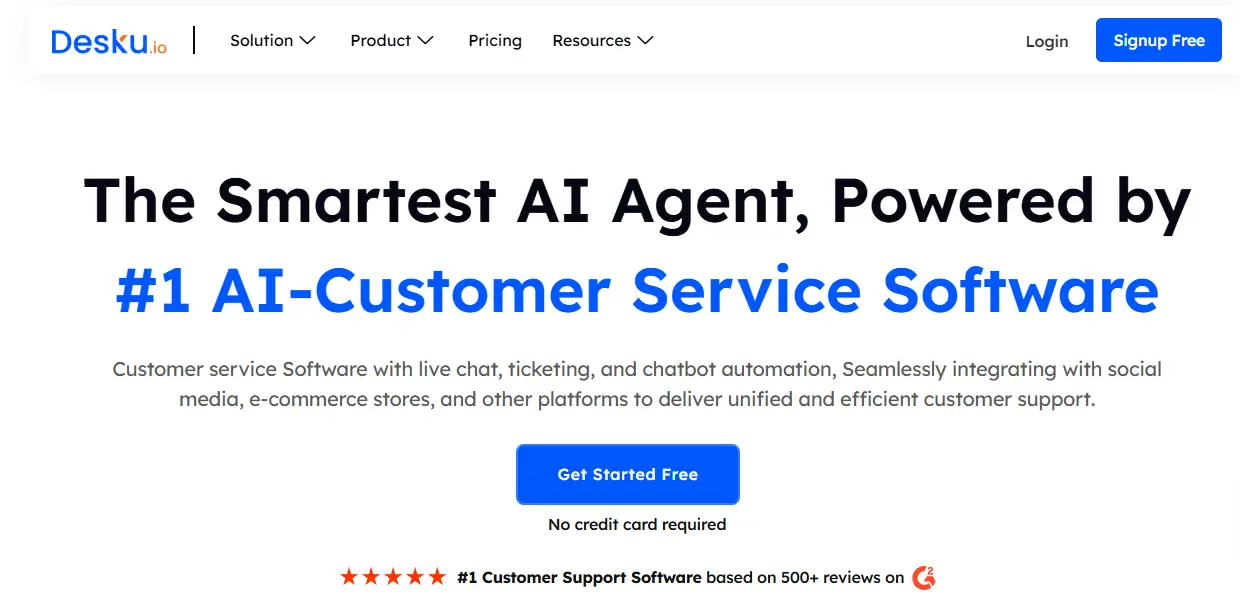
Desku is a modern help desk solution designed to simplify customer support for SMBs. It offers multi-channel support, built-in automation capabilities, and a powerful self-service portal, making it a highly affordable and user-friendly choice for small teams.
- Overview: A modern help desk solution designed to simplify customer support and enhance team productivity.
- Key Features: Multi-channel support, built-in automation capabilities, and a powerful self-service portal.
- Pros: Affordable and user-friendly interface with easy onboarding. Ideal for small to medium-sized teams.
- Cons: Limited advanced ITSM features for large enterprises.
- Pricing: Starts at $10 per user/month.
- Best For: SMBs and customer support teams needing an intuitive and affordable platform.
2. SolarWinds Service Desk
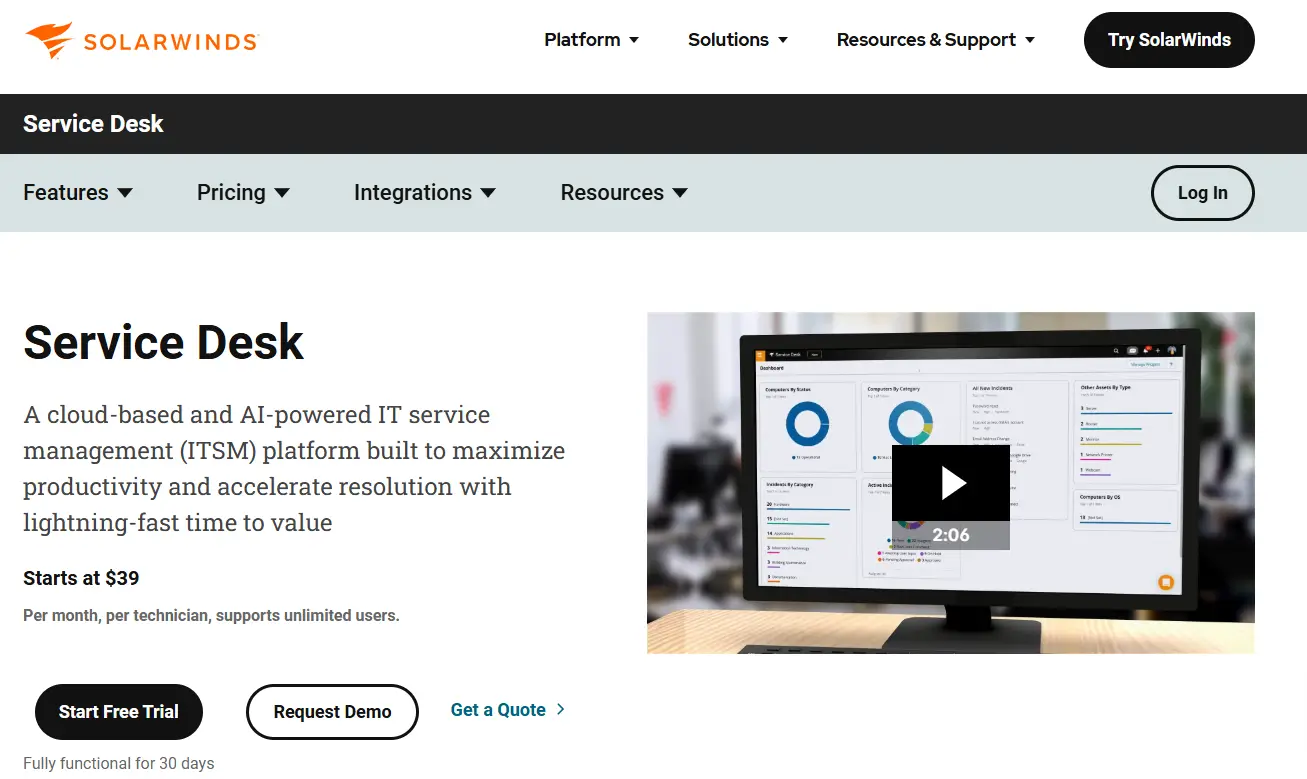
SolarWinds Service Desk is a cloud-based service desk solution that stands out for its robust asset management tools, intuitive ticketing system, and effective problem management features. It’s ideal for e-commerce businesses and customer service teams needing seamless integration.
- Overview: A cloud-based service desk solution with excellent remote monitoring and automation capabilities.
- Key Features: Asset management, intuitive ticket management, and detailed problem management tools.
- Pros: Seamless integration with existing IT tools and real-time insights into it operations.
- Cons: Limited scalability for large businesses with diverse requirements.
- Pricing: Starts at $19 per user/month.
- Best For: E-commerce businesses and customer service teams.
3. Freshservice
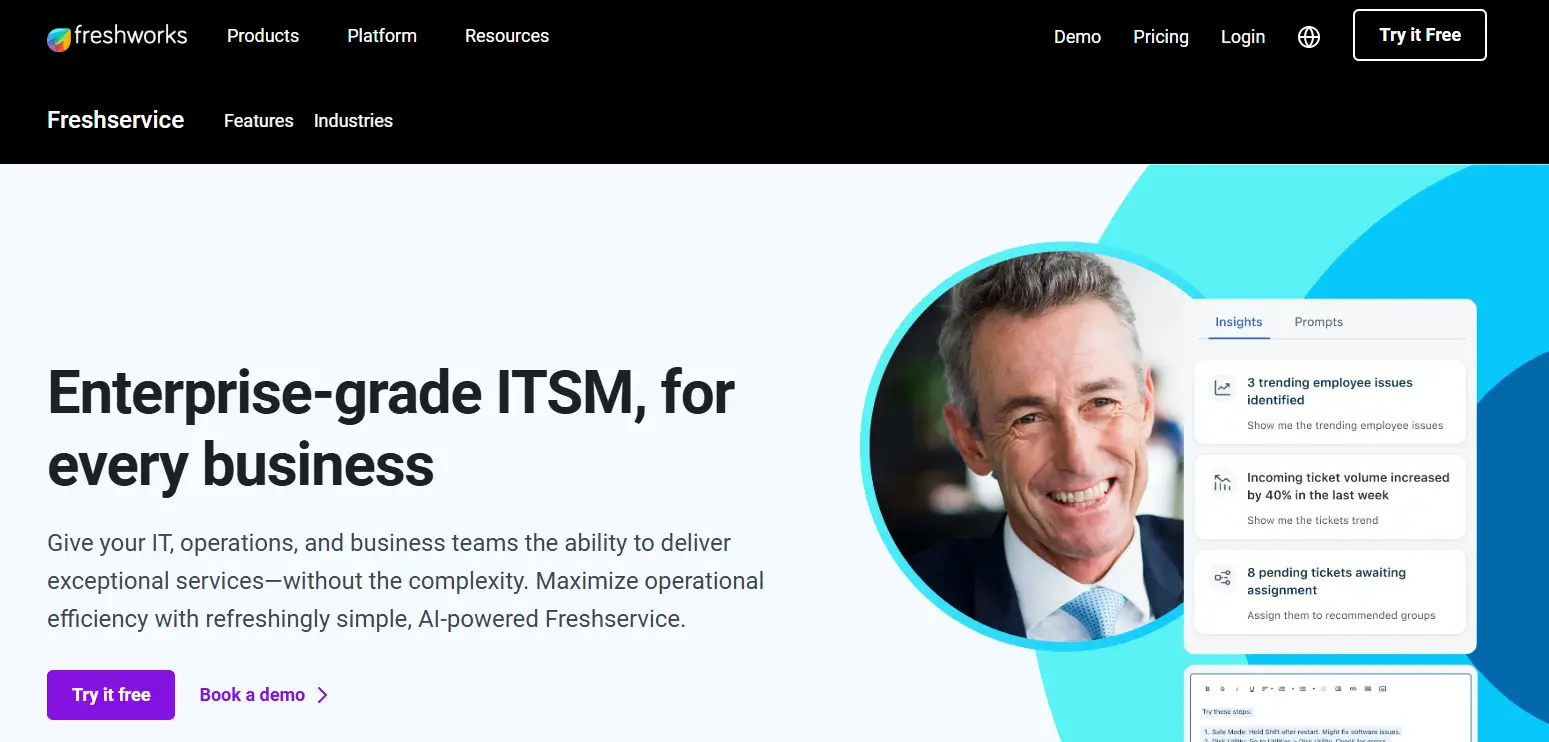
Freshservice is a modern, cloud-based ITSM tool known for its ease of use. Its standout features include automation capabilities, a comprehensive knowledge base, and a customizable service catalog, making it perfect for SMBs and teams seeking quick implementation.
- Overview: A modern, cloud-based ITSM and desk software known for its ease of use.
- Key Features: Automation capabilities, knowledge management, and customizable service catalog.
- Pros: Simplifies manual processes with automated workflows.
- Cons: Limited reporting tools for complex requirements.
- Pricing: Starts at $19 per user/month.
- Best For: SMBs and teams needing quick implementation.
4. ServiceNow

ServiceNow is a robust enterprise service management platform designed for large organizations. With features like configuration management, advanced business rules, and scalability, it offers tailored solutions for complex business needs.
- Overview: A robust enterprise service management platform with extensive features for it infrastructure and service delivery.
- Key Features: Configuration management, advanced business rules, and a scalable architecture.
- Pros: Excellent for large businesses; offers tailored solutions for complex environments.
- Cons: High cost and complexity for smaller teams.
- Pricing: Custom pricing based on organization size.
- Best For: Enterprises with extensive IT operations.
5. Zendesk
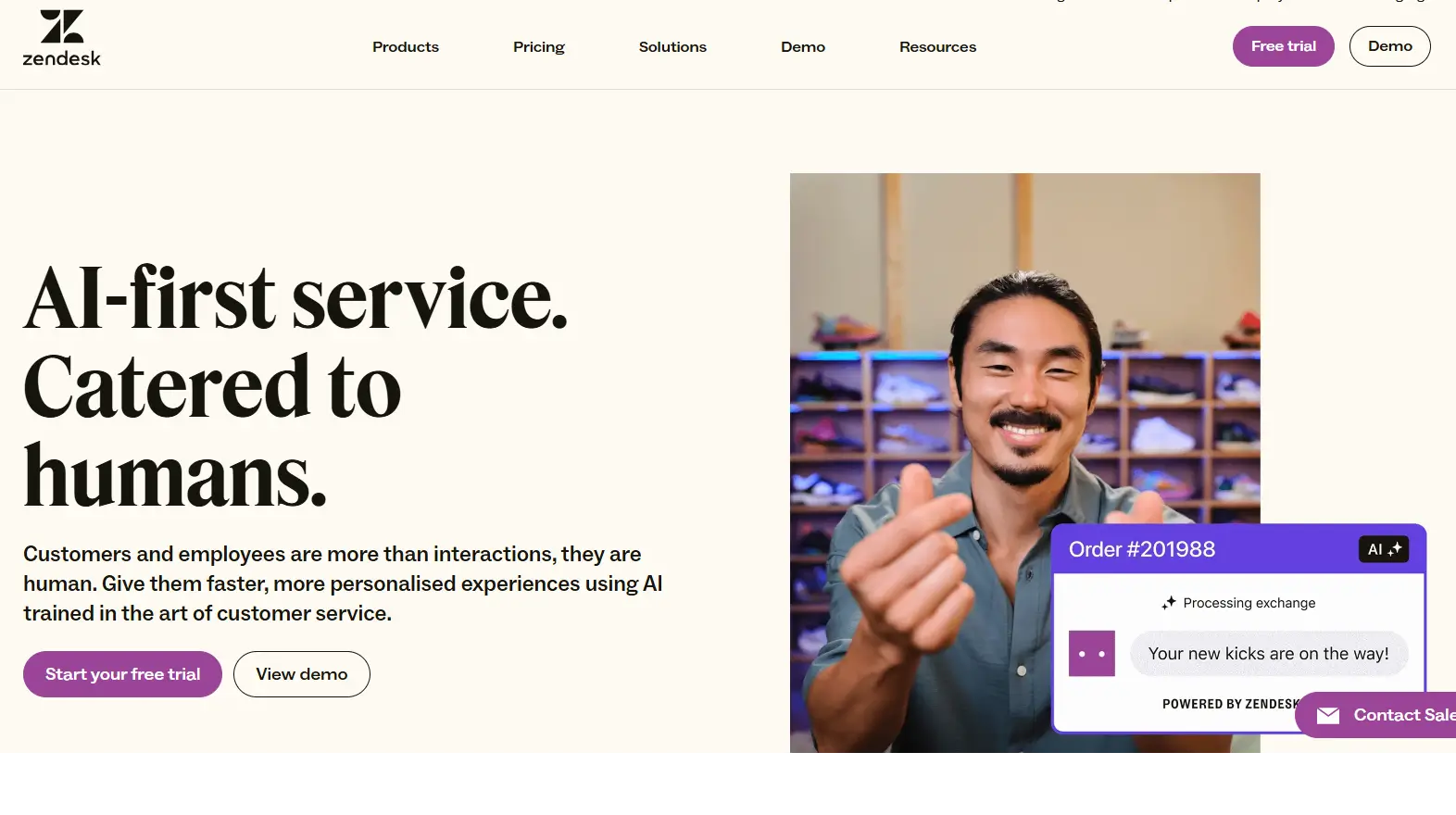
Zendesk is a popular service desk solution focused on improving customer support and employee experience. Known for its intuitive user interface and multi-channel ticketing, it’s a great option for SMBs prioritizing customer engagement.
- Overview: A popular service desk solution designed for improving customer support and employee experience.
- Key Features: Intuitive user interface, strong ticketing system, and powerful automation for routine tasks.
- Pros: Supports seamless integration with multiple tools; excellent for handling service requests.
- Cons: Limited IT-focused features compared to other platforms.
- Pricing: Starts at $49 per user/month.
- Best For: SMBs and customer support teams focusing on customer service excellence.
6. ManageEngine ServiceDesk Plus
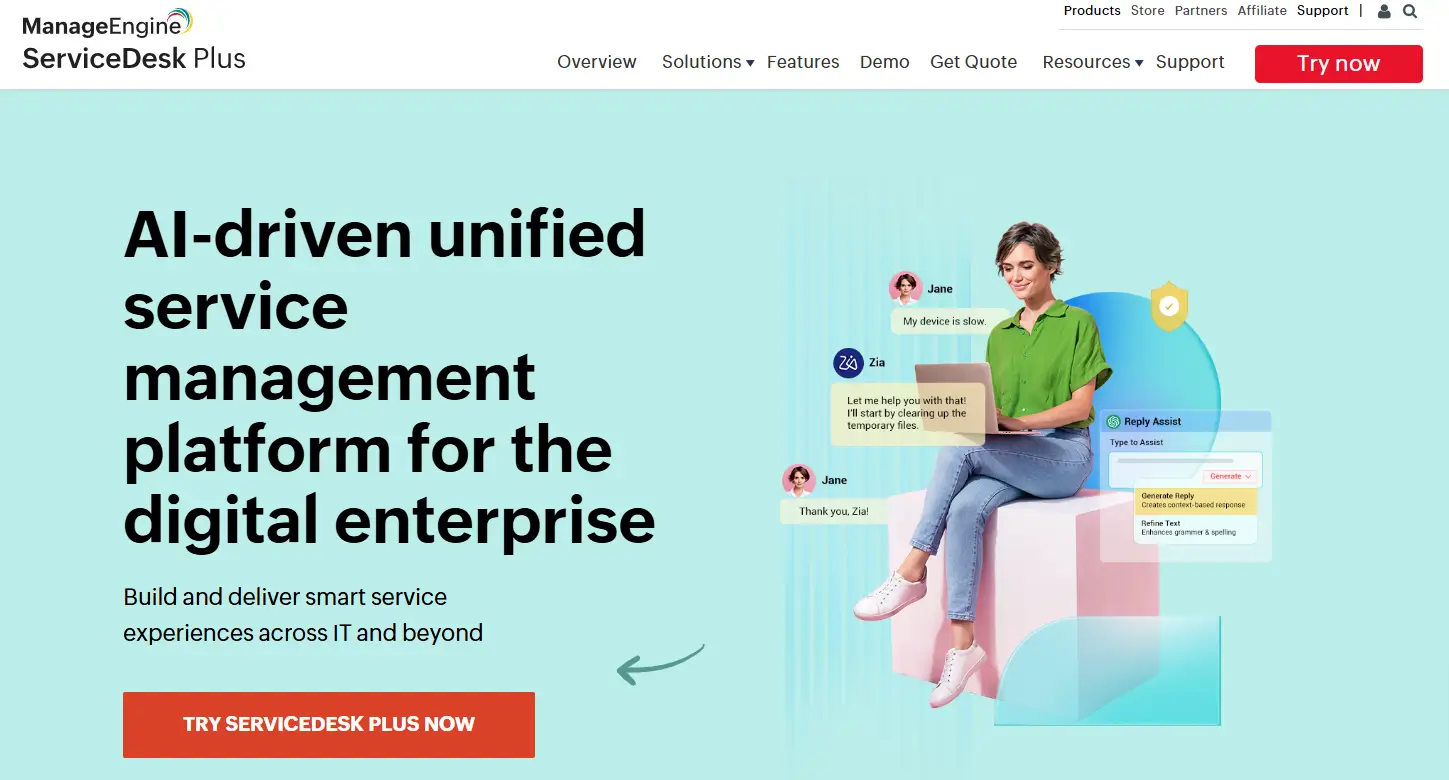
ManageEngine ServiceDesk Plus is a cost-effective service management solution catering to SMEs. It combines tools like incident management, change management, and asset management in an affordable package, ideal for organizations with budget constraints.
- Overview: A comprehensive service management solution offering a range of tools for IT and non-IT teams.
- Key Features: Asset management solution, incident management, and change management.
- Pros: Combines IT operations management with an affordable pricing structure.
- Cons: Slightly outdated design; limited features for advanced automation.
- Pricing: Starts at $10 per user/month.
- Best For: SMEs and organizations needing affordable ITSM tools.
7. BMC Helix ITSM
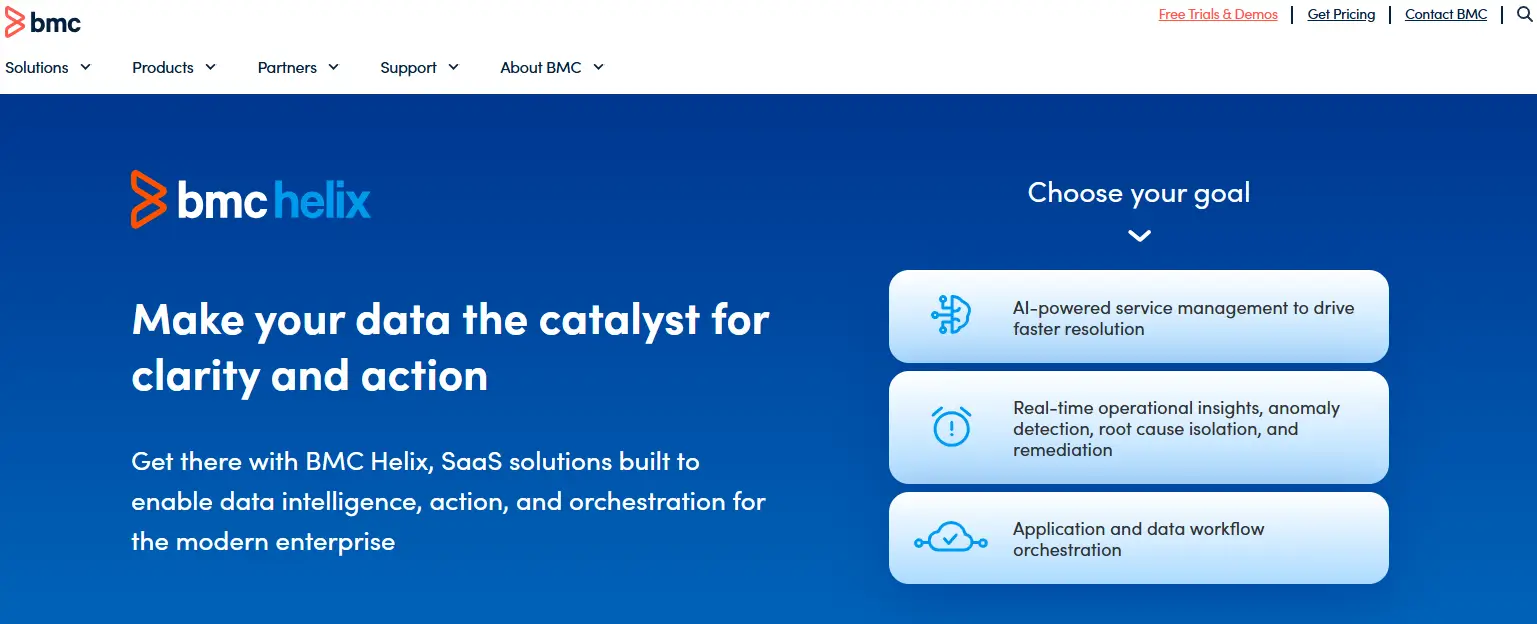
BMC Helix ITSM is an AI-powered platform designed for large enterprises. It features advanced configuration management, release management, and predictive analytics, providing complete visibility into IT operations for complex environments.
- Overview: A robust, AI-driven ITSM software designed for large businesses with complex IT environments.
- Key Features: Advanced configuration management, release management, and predictive analytics for problem management.
- Pros: Offers complete visibility into IT operations; highly scalable.
- Cons: High implementation costs and longer deployment timelines.
- Pricing: Custom pricing available on request.
- Best For: Enterprises and IT departments managing diverse environments.
8. Ivanti Service Manager
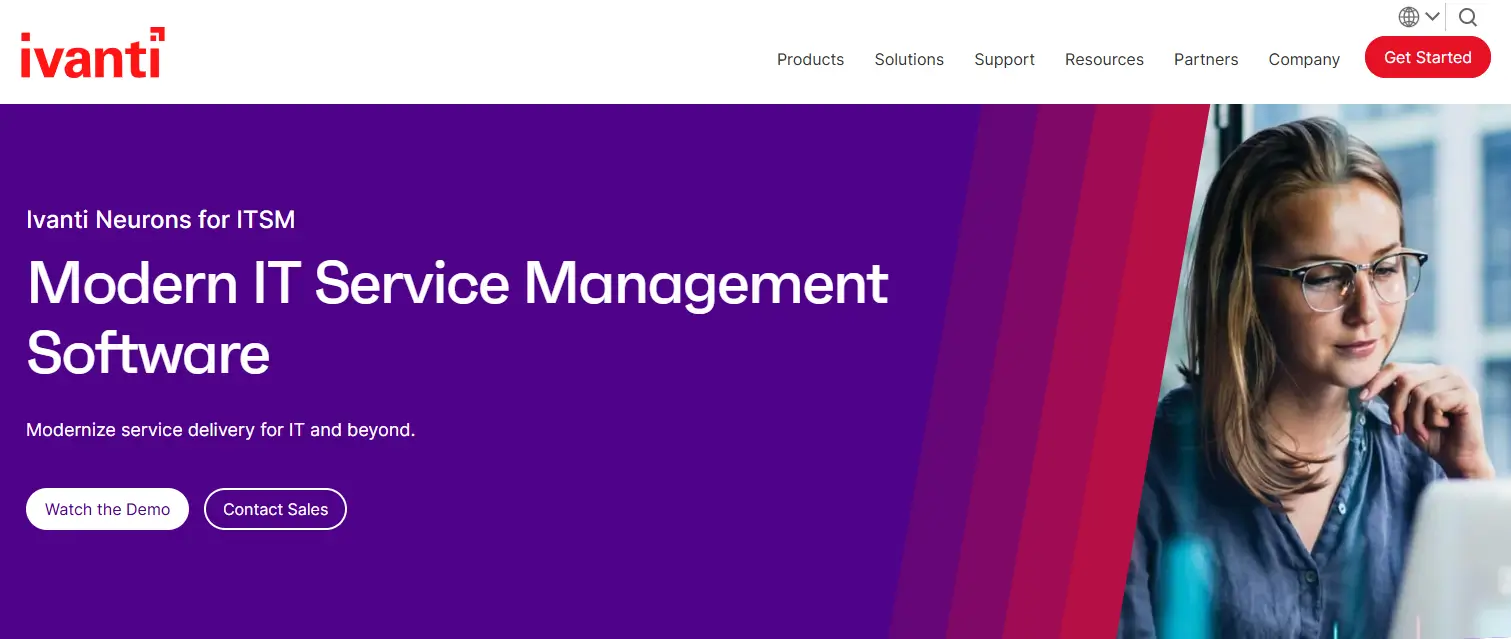
Ivanti Service Manager is a highly customizable management platform that offers powerful automation capabilities. Its features include patch management, a robust knowledge base, and remote control options, making it ideal for SaaS companies and managed service providers.
- Overview: A flexible management platform with strong automation and workflow customization options.
- Key Features: Patch management, knowledge base, and service request management.
- Pros: Highly customizable; supports remote control and business rules automation.
- Cons: Steep learning curve for beginners.
- Pricing: Starts at $20 per user/month.
- Best For: SaaS companies and managed service providers.
9. Spiceworks Help Desk
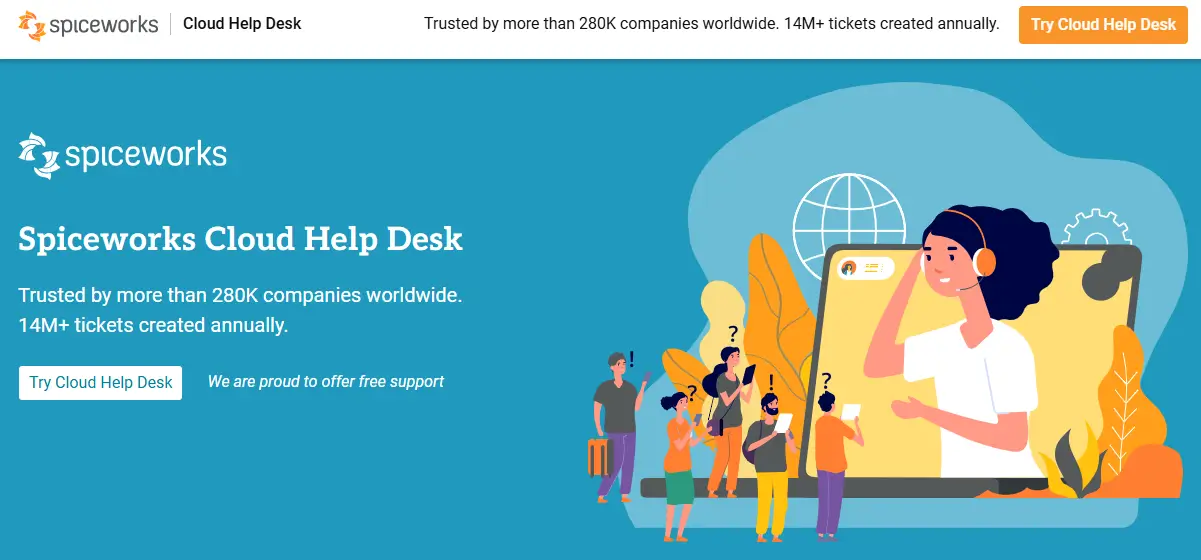
Spiceworks Help Desk is a free, entry-level desk solution that’s perfect for SMBs with basic needs. It provides tools like a ticketing system, remote access, and knowledge management, all in a simple, easy-to-use package.
- Overview: A free desk solution tailored for small to medium-sized businesses.
- Key Features: Basic ticketing system, remote access, and knowledge management tools.
- Pros: Zero cost; simple interface for small teams.
- Cons: Limited scalability and features compared to paid alternatives.
- Pricing: Free.
- Best For: SMBs with basic help desk needs.
10. HappyFox Help Desk
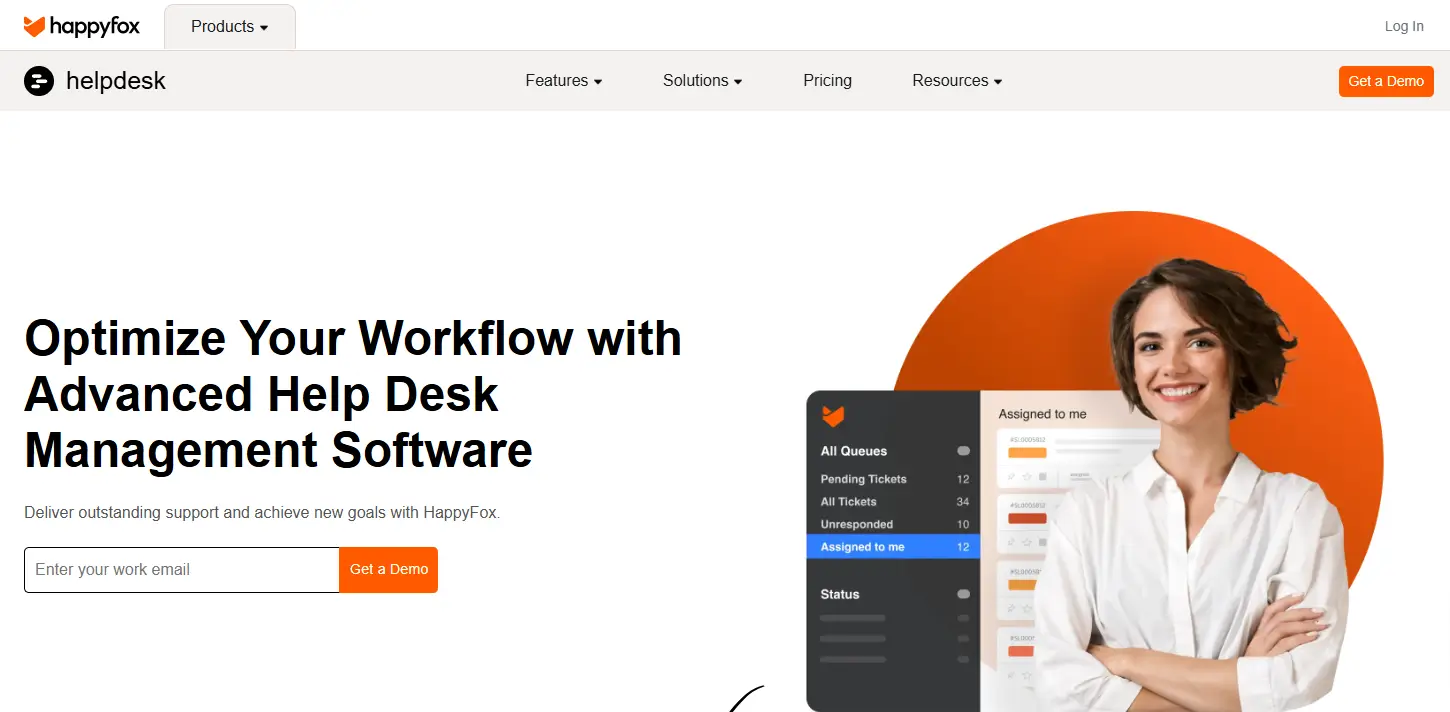
HappyFox Help Desk is a sleek and intuitive help desk software that prioritizes user satisfaction. It offers features like a self-service portal, SLA tracking, and multi-channel support, making it a solid choice for teams focused on customer experience.
- Overview: A sleek, modern help desk software offering streamlined workflows and automation for IT and customer support teams.
- Key Features: Self-service portal, SLA tracking, and multi-channel support.
- Pros: Clean design; end user satisfaction is a priority.
- Cons: Limited integration options.
- Pricing: Starts at $29 per user/month.
- Best For: Teams prioritizing a user-friendly interface.
11. Freshdesk
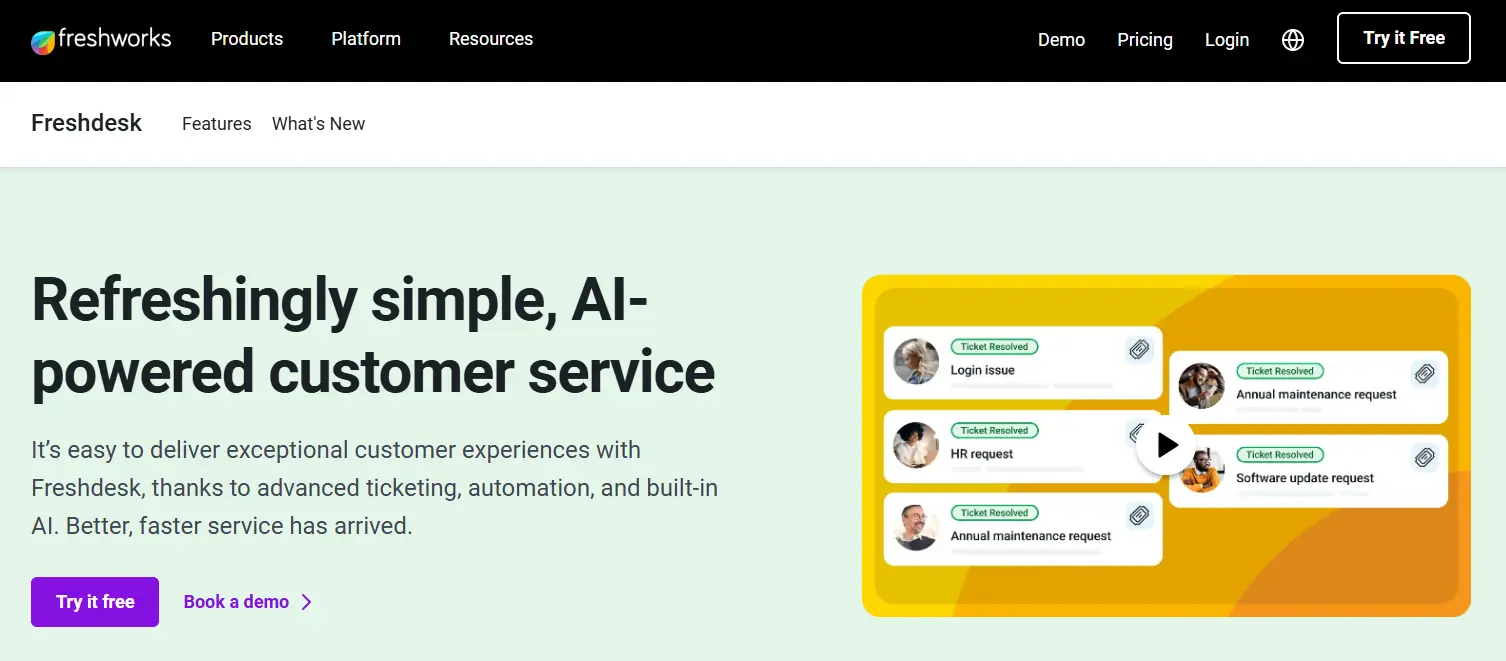
Freshdesk is a versatile, cloud-based customer support tool with ITSM functionalities. Its key features include automation, an easy-to-use ticketing system, and comprehensive reporting, making it ideal for small IT departments and customer service teams.
- Overview: A versatile, cloud-based customer support tool with ITSM functionalities.
- Key Features: Automation capabilities, ticket management, and comprehensive reporting.
- Pros: Affordable; integrates well with business processes.
- Cons: Lacks advanced IT operations tools.
- Pricing: Starts at $15 per user/month.
- Best For: Customer service teams and smaller IT departments.
How to Choose the Right Solution for Your Business
With so many options available, picking the perfect ITSM solution can feel overwhelming. Here’s a step-by-step guide to help you make an informed decision:
1. Define Your Organization’s Needs
Start by outlining your specific requirements. For example:
- Do you need a service desk solution with a strong ticketing system for a small team?
- Are features like asset management, self-service portals, or automation capabilities critical?
- How important is scalability to support future growth?
Understanding your must-haves will narrow down the options.
2. Assess Your Budget
Platforms vary significantly in cost, ranging from free tools like Spiceworks Help Desk to enterprise-level solutions like ServiceNow. Consider:
- Total cost, including setup and licensing fees.
- Value for money in terms of features and support.
- Availability of free trials or freemium options to test usability before committing.
3. Prioritize Integration and Usability
Look for platforms with a user-friendly interface and seamless integration capabilities. Ask:
- Does the tool integrate with your existing software, such as Microsoft Teams or CRM systems?
- How steep is the learning curve for your team?
- Does it support the automation of routine tasks to save time?
4. Consider Support and Resources
Your team may require ongoing assistance. Evaluate the available customer support, training resources, and knowledge base offered by each provider.
5. Plan for Future Growth
Choose a solution that grows with your business. Scalability is critical for businesses handling increasing service requests or managing complex business operations.
6. Test Your Shortlist
Once you’ve identified a few options, test them using:
- Free trials or demo versions.
- Feedback from end users to gauge satisfaction.
- A checklist of how well they meet your organization’s requirements.
By following these steps, you’ll be able to find a platform that aligns with your unique needs while ensuring a smoother transition for your team.
Conclusion
Finding the right alternative to SysAid can significantly enhance your organization’s service management processes. Whether you’re a small business focusing on cost-effectiveness or a large enterprise seeking advanced features like configuration management and automated workflows, there’s a platform out there tailored to your needs.
The key is to prioritize your organization’s unique requirements. Evaluate platforms based on their key features, pricing, and scalability, and don’t hesitate to leverage free trials to make an informed decision.
With options like Desku for simplicity and affordability, or ServiceNow for comprehensive enterprise solutions, your team can improve operational efficiency, streamline incident management, and boost end user satisfaction.
FAQs
1. What are the best free SysAid alternatives?
Platforms like Spiceworks Help Desk offer free solutions with basic features, making them ideal for small businesses with minimal needs.
2. Which ITSM tool is best for large enterprises?
ServiceNow and BMC Helix ITSM stand out for their scalability, tailored solutions, and robust configuration management capabilities, making them excellent choices for larger organizations.
3. How important is automation in choosing a help desk platform?
Automation is crucial for streamlining routine tasks, reducing manual workloads, and improving response times. Look for platforms with strong automation capabilities, such as Freshservice or SolarWinds Service Desk.
4. Are there alternatives focused on customer service?
Yes, tools like Zendesk, Desku, and Freshdesk are designed to enhance customer support with features like multi-channel ticketing and self-service portals.
5. What features should a service desk solution have?
Essential features include a ticketing system, knowledge management, asset management, and tools for change management and incident management. Scalability and integration options are also important for growing businesses.
- About the Author
- Latest Posts
Gaurav Nagani was the Founder of Desku, an AI-powered customer service software platform.
- Email Management: Best Strategies, Tools & Tips for SaaS and Ecommerce
- Shared Inbox Guide: Definition, Benefits, Tools & Best Practices 2025
- LivePerson Pricing Exposed: What They Don’t Show You on Their Website
- Automate Customer Support with AI A Practical Guide
- Desku vs UsePylon: Which One Scales Better for Startups?


